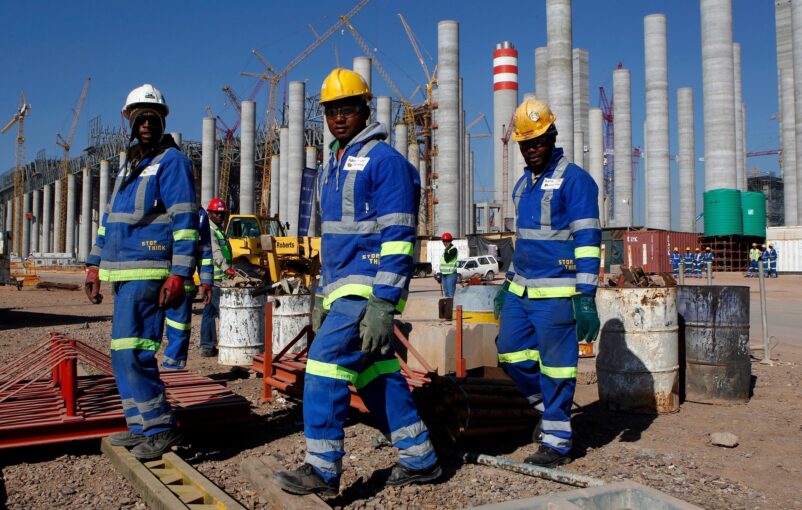Africa CAN be developed

Africa CAN be developed
BY MURIEL KGOMOTSO GILL
A South African advocate of developing African economies from within
- Introduction
The fact that we’re talking about the development of Africa does not suggest that there is no development at all, rather the article wants to focus of how the current level of development in Africa can be accelerated. Academic definition of development states that development is first and foremost about the development of people, and not necessarily structures.
- The current situation
The middle class has grown to 310 million over the past 30 years, representing some 34% of the continental population. Of these, high net worth individuals have grown from 95 000 in 2008 to 177 000 in 2019. Some have reached the middle class through education and managerial and skilled work through foreign direct investment (FDI) corporations.
Although the middle-class figure is encouraging, many are described as floating and could slide back into poverty should any mishap take place. A World Bank report states that a further 424 million people on the continent live in extreme poverty.
Amongst other causes of poverty on the continent, over reliance of the economy on natural resources is cited as one of the causes of poverty. This is a sensitive issue on the continent, as the truth of the matter is that African countries are paid a pitiful amount for their resources. The other side of the coin is that over reliance on resources means that the economies are under diversified. But with very little revenue from resources, how do governments afford to invest in infrastructure that is a precursor to economic development?
The present situation is that in some countries, FDI is growing and driving economic growth. Micro informal trading is very high, in some cases, accounting for 86% of the workforce, however yielding very little profits. This seems like two extremes; there is a missing small and medium formal enterprises in between. Agricultural production methods are primitive, and upgrading agricultural methods is projected to raise 110 million out of extreme poverty. Industrialization is low and 60% of farm produce goes to waste.
- Development is partnership between the government and the populace
Governments build the infrastructure that allows businesses to operate smoothly. Typically, they should also provide capital support, as well as business skills training and access to goods’ markets support. They create an environment in which business should thrive, but they are not the creators of enterprises, not creators of wealth and not creators of job opportunities. The creation of business enterprises, wealth and employment opportunities, is mainly in the domain of entrepreneurs.
In the absence of proper infrastructure, does it mean that entrepreneurs cannot start businesses? No. Entrepreneurs wade muddy waters.
- Entrepreneurship get the ball rolling
For governments to provide infrastructure, they need to have funds. Alternatively, they may borrow, but even their borrowing capacity is dictated by their ability to repay the loans; essentially their GDP and its prospects and the tax revenues collected. So, in essence, it is entrepreneurship that gets the ball rolling. Entrepreneurs start businesses and employ people. As they and their employees pay taxes, government revenues grow, they have improved credit rating, and the money obtained through loans and taxes can be used to improve infrastructure.
- Criticism and arguments against Africa’s development
When we talk about Africa developed by Africans primarily from within, resisting the urge to go overseas to look for a better quality of life, some immediately proffer profuse criticism. They state that Europe and America were built over a period of more than 200 years. Yet, there are contrary examples. After WW2, German economy and infrastructure were decimated, but within ten years they had rebuilt their economy. It might not have been as strong as it was before the war, but it was functional, and poverty was mainly eliminated. Another similar example is China after the war. Dubai in 1983 was a semi-developed desert, but today it is the second wealthiest city in UAE. Yes, Dubai is a city, but it can be extrapolated to a country.
In all the above practical 3 examples, industrialization was prioritized, improved agricultural methods, and output were emphasized in China. Germany prohibited cartels and the formation of monopolies, thus spreading production benefits to a wider section of the population. Money received from oil in Dubai was used to build infrastructure, and today, less than 1% of their GDP is from oil. This is to highlight that they are not over reliant on their oil resources and have diversified their economy into manufacturing and tourism, among others.
One may argue that in all the above 3 examples there was political will and leadership, and that largely fed directly into their success stories. While that is true, entrepreneurs too have collective power that can change the economic status of a country.
By the same author: An alternative model for Africa’s economic development
- We are CAPABLE
We, as Africans, are well able to create meaningful sustainable enterprises that can create employment and contribute to economic growth. We can create economies where many find employment and improve their living standards. With a developmental mentality, we can decide to stay in Africa by choice, engage in improved farming methods yielding higher produce, engage in agro-processing and small manufacturing, create jobs and contribute to reducing poverty levels. E.g., if 1 million people in a country take up meaningful entrepreneurship and employ 2 other people, 3 people will be employed, soon 3 million will be employed and have a monthly livelihood. If they take care of 2 other people, i.e., 3 people live on 1 salary, 9 million people will be lifted from below the breadline. Replicate it in every country and many will escape extreme poverty.
We can develop Africa from within. We can create an improved quality of life for ourselves here in Africa, instead of going to the west for a better quality of life. A builder’s mentality is needed.
- Daily affirmations to building a new identity
Through various means of mass communication and the way we have been portrayed and our continent has been portrayed over the years, it is likely that the message has seeped through our psyche and affected and distorted a true picture of who we are, our abilities and capabilities and what we can achieve. We need to reverse the lie with the truth. We need to look ourselves in the mirror every morning, affirm our talents and abilities, reprogram our minds. We cannot build big from an affected mindset that is filled with self-doubts, that sees obstacles instead of opportunities. We need to rise up in our minds before we can build, believe that we are capable and worthy of a lifestyle that is way above the breadline. We are created by God with talents just like any other people, loved by God just like any other people and deserve a better quality of living just like any other people. We are able and we will build Africa from within. We will make Africa great, we will be part of those who care enough about our brothers and sisters to lift them up out of poverty. We have a builder’s mentality as opposed to a consumer mentality.
By the same author: Ideas for Africa’s economic development
- The NPO and its approach
Not every economic activity adds to economic growth, as evidenced by our continental contribution to global GDP. China and India have almost the same population size as Africa, and their contribution to global GDP are 18 and 9% respectively, but our own contribution is only 3%. This partly explains high unemployment and means that our economies are not diversified and industrialized; a documented fact that sub-Saharan economies need industrialization.
The NPO solution is to address the 3 documented constraints to entrepreneurship on the continent; 1) lack of capital, 2) insufficient business skills and 3) sometimes lack of access of goods to markets. The NPO proposes to divert many engaged in informal trading into agro-processing and small manufacturing. The first step is to provide free entrepreneurship training, then link them up with interested individual businesspeople from the general north/west. Usually, the exchange rates and the low cost of capital will be favorable. Investing businesspeople will be like mentoring partners; providing ongoing mentoring, while the entrepreneurs are encouraged to read up on business skills on an ongoing basis. Where appropriate, investing partners may help facilitate access to foreign markets, but the first emphasis will be to produce for the local and regional markets first. The aim of the NPO is for these partnerships to be mutually beneficial to both parties. Prospects of success are high since the level of manufacturing and competition are low.
Small and medium enterprises (SMEs) are very important to any economy. The ILO reports that over 90% of businesses globally are SMEs and in some cases they absorb up to 70% of the workforce. Desktop research by the author confirms that 95 – 99% of businesses, even in first world countries are SMEs. More on this topic and others about Africa’s development can be found in the mini e-book in the 2 links below.
https://www.smashwords.com/books/view/1132489 (Smashwords)
http://getbook.at/BuildingAfricaM (Amazon)
___________
About the author

Ms. Muriel Kgomotso Gill has held various positions in the public sector in her native South Africa. She has worked for over a decade in the North West Department of Agriculture, has worked for United Nations Office of Project Services as a Project Manager, being responsible for the training and development of small and aspiring entrepreneurs. In her last public position, she worked for the University of South Africa in their Research Department.
She has had a short 3-year stint in private business and is the founding member of Africa Accelerated Economic Development, a non-profit organization dedicated to accelerating small-scale manufacturing on the continent, with the aim of growing sub-Saharan economies, creating job opportunities, and reducing poverty levels.

